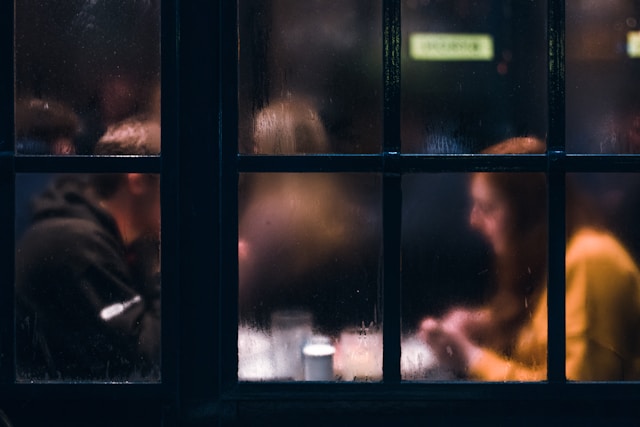The Sad Girl
I have a story for you, of a young girl who was sad, I said.
Did you know her? you asked.
No, well – yes and no. I feel like I know her.
Why was she sad? you asked.
You have a lot of questions, I said. Are you going to let me tell this story?
You smiled and tucked your feet under you on the couch. OK, you said, I’m ready.
The sad girl was seventeen. Her hair was long and the color of cedar and her eyes were molten amber and full of tears.
I did this for him, she said, her face tight with pain. She was left alone, on the bed, the hotel room window shut to the noises of the street, which seeped in anyway, a tuneless hum of muted voices and car horns.
She curled up in a ball, only removing her high topped shoes, and pulled the bedspread up to her chin. She was grateful she had not needed a coat hanger or knitting needle. She waited – for the pain to go away, for the awful smell of antiseptic to leave her nostrils, for the white coated doctor’s brusque treatment of her to fade.
I’m not liking this story, you said.
Hold on, I said.
The sad girl slept for ten hours.
A gentle knock at her door, the turn of a key, a quiet voice asking, May I come in? He was tentative, gentle, perhaps a little embarrassed. It’s just me, he said. Are you ready to go?
Was he the one? You asked.
No, I said. A friend.
The friend gathered her carpet bag and helped her up, descended in the elevator to the waiting taxi, and to the train which took them north. To her mother. Her mother anguished, disapproved, both of these things at once, because she loved her.
She was lucky, I said. Above all she was loved.
What did the mother know? you asked.
The mother knew the man her daughter loved was powerful. She believed he would honor the engagement and marry her daughter. She also knew he was keeping his distance in spite of his promises to visit, to take over the family business.
Did the sad girl ever get better? you asked.
Not while the pain in her heart filled her head with despair, I said.
I miss him so, the sad girl said, crushing a cherry colored petticoat to her face, hiding her amber eyes, hiding in her room, remembering this gift from him had thrilled her to melt into his arms.
I am waiting, she wrote to him, and I am pretending you are here with me, playing cards, singing songs, cuddling on the couch.
When are you coming? She wrote to him, penning her letters with desperate death wrapped in dark hilarity, wiping tears with embroidered hankies.
Between broken depths of sleep which left her bereft of hope his letters said, not now.
You can’t go out, her mother shrieked. Whatever would he think? Give him no excuses. Wait, her mother pleaded.
Her mother let the friend visit from time to time, in the parlor, with tea. She could hear her daughter weeping between words. The friend was kind. He listened.
My God, you said. I hope you tell me she survived.
She did, I said. But it was a near thing.
The friend said, He’s not worth it. The sad girl forgave herself, though she continued to love the man who had left her cruelly alone, who had married someone else.
Her mother unlocked the door to sun and sweet breezes. She knew the only man her daughter loved was not coming.
I do this for me, the sad girl said, and found a man to marry. She sang him songs and walked with him through pine forests.
She had a little girl. She named her after the only man she really loved.
They lived happily for a few years, in the very town where the only man she had ever loved lived with his wife and children.
I don’t understand the power of that love, you said.
Nor do I, I said.
The sad girl’s husband died when the little girl was three. She moved back in with her mother, who was content to have the family snug under her roof, for she was getting old and needed comfort.
The little girl was happy when her grandmother gave her kisses and her mother tucked her in every night with lullabies, and cousins came over to play.
The sad girl grew happy going out to teas again, appearing in the social columns, as she had before, before the cherry petticoat. Until the day she married again.
I sense more sadness is coming, you said.
He was a drinker, I said.
Is that it? you asked.
No, I said.
The sad girl died of cancer after two years of marriage. Her mother was too ill to take care of the little girl who was eleven. The cousins would not take her in. The stepfather sent her away.
What a terrible life, you said.
I know, I said.
So, that’s the end? you asked.
I smiled. No, I said.
The little girl did not have a happy life, but she grew up and found someone to marry, had a girl of her own.
You looked at me with eyes of molten amber and full of tears and hair the color of cedar.
Sometimes it takes a very long time to get to a happy ending, I said.

Joan Lisi is a resident of Tucson, and a graduate of The Pennsylvania State University. She is a published author of a biographical historical novel. She writes short fiction and is grateful for all the support she has received from the writers groups who have welcomed her in.



